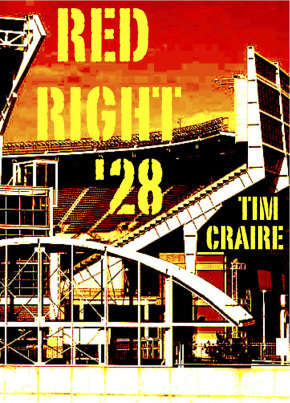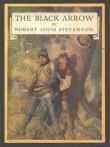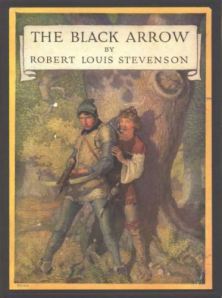Tim Craire's Blog, page 5
January 12, 2014
Science fiction football cover
 There’s a headline I don’t see often. This is a cover I might have put up had I used Red Right ’28 as the title story for the 3-story collection, Tropic of Labrador. That’s the stadium in Cleveland . . . in a May Day red-shift.
There’s a headline I don’t see often. This is a cover I might have put up had I used Red Right ’28 as the title story for the 3-story collection, Tropic of Labrador. That’s the stadium in Cleveland . . . in a May Day red-shift.


January 7, 2014
Tropic of Labrador
 New reading: three stories set later this century.
New reading: three stories set later this century.
-A Clevelander (who else?) reforms football and falls for the enemy
-A bored national security agent asks: Why spy when you can own?
-A bar owner adapts in 2080:
Excerpt:
Candy’s Restaurant, Myra’s Sunset Grill, Abuela Maria’s, our good friends at Herman’s Surf Shack, and the First Nation cafeteria were among the entrants. Jellyfish are nutritious, especially when combined with other foods, and delicious, especially when combined with other foods.


Rejected cover
I’m glad I used a pro for this one — this cover below was what I thought of, for my story about postiive-thinking climate migrants in Canada in 2080:
x
x
x
x
x
x
o
o
x
x
I had thought a vintage map would be interesting, but . . . I like my cover guy’s idea much better:


January 5, 2014
Tropic of Labrador
 New reading: three stories set later this century.
New reading: three stories set later this century.
-A Clevelander (who else?) reforms football and falls for the enemy
-A bored national security agent asks: Why spy when you can own?
-A bar owner adapts in 2080:
Excerpt:
Candy’s Restaurant, Myra’s Sunset Grill, Abuela Maria’s, our good friends at Herman’s Surf Shack, and the First Nation cafeteria were among the entrants. Jellyfish are nutritious, especially when combined with other foods, and delicious, especially when combined with other foods.


December 19, 2013
Book review: Bloodstone – Deep Water, Book One; Jeffrey Aaron Miller
 I enjoyed this fantasy novel, in large part because the author, Jeffrey Aaron Miller, writes well.
I enjoyed this fantasy novel, in large part because the author, Jeffrey Aaron Miller, writes well.
Without giving too much away: The protagonist is Jeren, a son of minor nobility who is not a rule-follower. A vicious, one-sided war and a stranger with mysterious powers disrupt Jeren’s quiet life and force him to the edge of ruin. A strong young woman named Aleas, not disposed to respect Jeren, is compelled by circumstances to join him.
Miller’s writing is clear; descriptive without being overcooked. I always say a silent thanksgiving, for example, whenever a writer can describe his characters eating without overreaching for yet another slurp or munch.
And here’s a description of Aleas:
“Nevertheless, he fell asleep thinking of her, that flawless skin, the curve of those uncovered shoulders, her bright green eyes — filled with hate for him, yes, but didn’t even the hate in those eyes look lovely?”
Very nice.


November 20, 2013
My novel would get an A on the Swedish gender bias test!
 . . . if it were a movie, that is. A film group in Sweden has created a new gender bias rating, which is apparently either “A” or nothing, called the Bechdel test. It has three rules:
. . . if it were a movie, that is. A film group in Sweden has created a new gender bias rating, which is apparently either “A” or nothing, called the Bechdel test. It has three rules:
– There must be at least two women with names in the film.
- At least two women must talk to each other at some point.
– The women must talk to each other about something other than a man.
http://www.euractiv.com/culture/swedish-cinemas-introduce-femini-news-531648
But you know, it is close; The Pennants of Larkhall has plenty of strong women — Queen Rowena holds the realm together after her husband is killed, while their son Harlan is away; her daughter, Princess Calandra (Calley), is Harlan’s right-hand woman; and Calandra’s cousin Amira is active, shall we say, and ambitious to a fault — but they do not often talk to each other. Rowena upbraids (male) soldiers, and takes reports from the (male) commander of the army, but that’s not enough to pass the test.
But they talk to each other — more than once! I’ll take the “A.”
Here’s one such passage — two women talking to each other during a siege:
Larkhall did not have a plan if the walls broke down. The castle was the plan; that was all. No enemy had ever broken in. If the northerners managed it, what then?
“We could head to the fortress, but it might be too crowded with other families doing the same thing,” Elise said. “It would be. We’re not close to it; too many other people would beat us there. And the fortress isn’t big enough to hold everyone in the whole castle, not anymore. So what would we do?”
“We’ll keep your longest knives about,” Marlatta said.


November 18, 2013
Clouting a yard of arrow through your inwards
 Probably my favorite line from The Black Arrow comes early:
Probably my favorite line from The Black Arrow comes early:
” . . . the man that ye have dispossessed and beaten is but the angrier, and some day . . . he will up with his bow and clout me a yard of arrow through your inwards.”
This could be a summary of Blowback by Chalmers Johnson, for one thing. I wish American foreign policy experts would beware the yard of arrow once in awhile.
(Robert Louis Stevenson, in this book, uses a lot of this odd reflexive “me” — is it authentic? I have no idea, but it sounds good.) (And the word “an” used for “if,” also; there’s a lot of that. I’d heard it before, somewhere, and my trusty brain remembered it, fortunately.)


November 13, 2013
The Black Arrow, Robert Louis Stevenson
 The Black Arrow is a commonly maligned book from Robert Louis Stevenson which I enjoy.
The Black Arrow is a commonly maligned book from Robert Louis Stevenson which I enjoy.
It’s maligned in large part because Stevenson himself, and also his wife, did not think much of it; in her preface to the edition I have, she (Fanny Van de Grift Stevenson) says that the novel “was continued with almost no effort, and chapter after chapter was despatched” to the publisher. After the novel was done, she said, Stevenson “took up other more exacting work.”
But this novel, set amid the Wars of the Roses, has lying knights, outlaw heroes, and secret castle passages! Desperate villains and a brave young woman! Dramatic threatening letters! And yes, black arrows!
The main character, Richard Shelton, hangs out with scoundrels, but they make no bones about it; for example Sir Daniel Brackley is very open about his plan for the war — sit out as much of it as he can, and join the eventual winner when the outcome seems sure; and Brackley’s lieutenant Bennett Hatch asks Richard for prayers in the event of his death, since Hatch suspects he’ll have a hard time of it in purgatory.
Safe to say that second-string Robert Louis Stevenson is still very good.


November 8, 2013
Like biking in Middle Earth!
I biked home today. Of course we are back in Daylight Whichever Time now (I can never remember which is which), and it is getting dark when I leave work.
I have a bike headlight that’s pretty good. When I pedaled up out of the garage into the twilight the headlight seemed pretty weak; but the darker it became, the stronger it seemed–
. . . something like lembas.
.


October 26, 2013
Payne-Gallwey, Sir Ralph: The Crossbow
I referred to Sir Ralph Payne-Gallwey’s book The Crossbow quite a bit when I wrote my fantasy novel, The Pennants of Larkhall.
It’s funny — my father had an old copy of The Crossbow and had mentioned to me that it was an out-of-print classic. Now I see that someone caught on — Skyhorse Publishing, specifically — and re-issued the book in 2007.
In addition to crossbows the book is exhaustive about siege weapons. And those large bows I mentioned which are shot by archers who lie down on their backs and hold them across the soles of their boots so they can haul back on the cords with both hands — did you think I made those up?
You can look up Payne-Gallwey’s book; mine is here:








